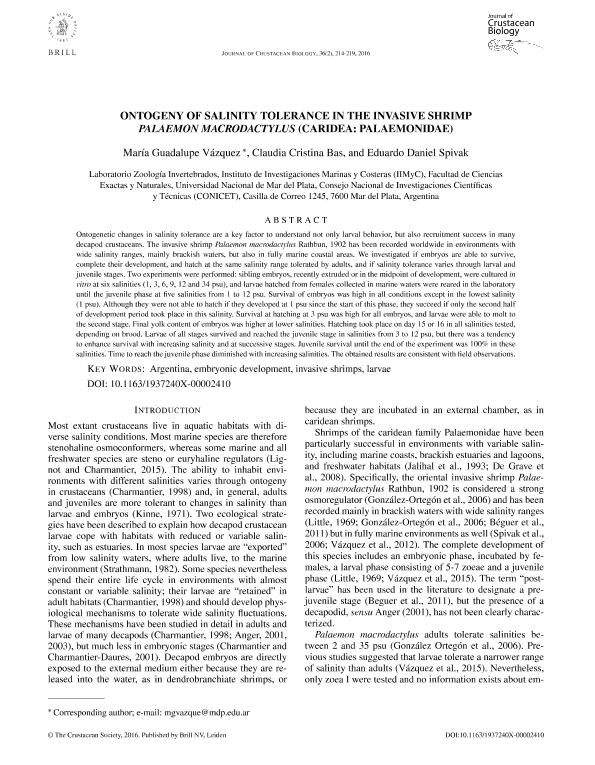Artículo
Ontogeny of salinity tolerance in the invasive shrimp Palaemon macrodactylus (Caridea: Palaemonidae)
Fecha de publicación:
12/2015
Editorial:
Crustacean Society
Revista:
Journal of Crustacean Biology
ISSN:
0278-0372
Idioma:
Inglés
Tipo de recurso:
Artículo publicado
Clasificación temática:
Resumen
Ontogenetic changes in salinity tolerance are a key factor to understand not only larval behavior, but also recruitment success in many decapod crustaceans. The invasive shrimp Palaemon macrodactylus Rathbun, 1902 has been recorded worldwide in environments with wide salinity ranges, mainly brackish waters, but also in fully marine coastal areas. We investigated if embryos are able to survive, complete their development, and hatch at the same salinity range tolerated by adults, and if salinity tolerance varies through larval and juvenile stages. Two experiments were performed: sibling embryos, recently extruded or in the midpoint of development, were cultured in vitro at six salinities (1, 3, 6, 9, 12 and 34 psu), and larvae hatched from females collected in marine waters were reared in the laboratory until the juvenile phase at five salinities from 1 to 12 psu. Survival of embryos was high in all conditions except in the lowest salinity (1 psu). Although they were not able to hatch if they developed at 1 psu since the start of this phase, they succeed if only the second half of development period took place in this salinity. Survival at hatching at 3 psu was high for all embryos, and larvae were able to molt to the second stage. Final yolk content of embryos was higher at lower salinities. Hatching took place on day 15 or 16 in all salinities tested, depending on brood. Larvae of all stages survived and reached the juvenile stage in salinities from 3 to 12 psu, but there was a tendency to enhance survival with increasing salinity and at successive stages. Juvenile survival until the end of the experiment was 100% in these salinities. Time to reach the juvenile phase diminished with increasing salinities. The obtained results are consistent with field observations.
Palabras clave:
Argentina
,
Embryonic Development
,
Invasive Shrimps
,
Larvae
Archivos asociados
Licencia
Identificadores
Colecciones
Articulos(IIMYC)
Articulos de INSTITUTO DE INVESTIGACIONES MARINAS Y COSTERAS
Articulos de INSTITUTO DE INVESTIGACIONES MARINAS Y COSTERAS
Citación
Vázquez, María Guadalupe; Bas, Claudia Cristina; Spivak, Eduardo Daniel; Ontogeny of salinity tolerance in the invasive shrimp Palaemon macrodactylus (Caridea: Palaemonidae); Crustacean Society; Journal of Crustacean Biology; 36; 2; 12-2015; 214-219
Compartir
Altmétricas




